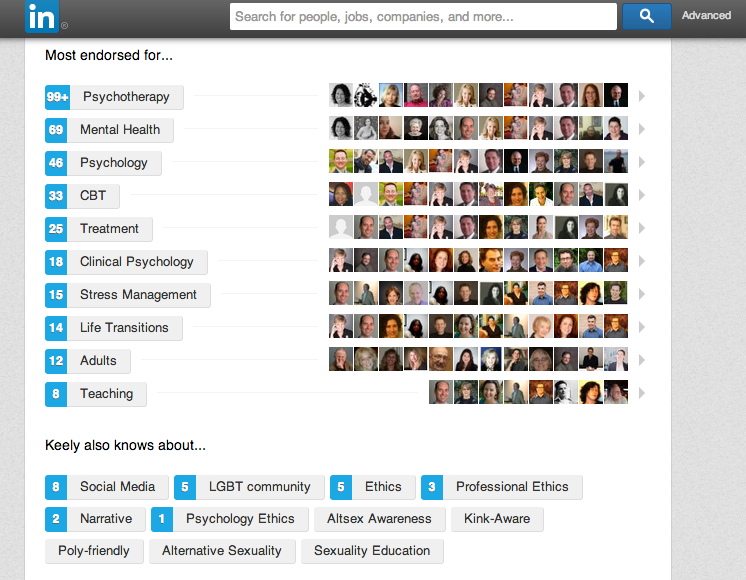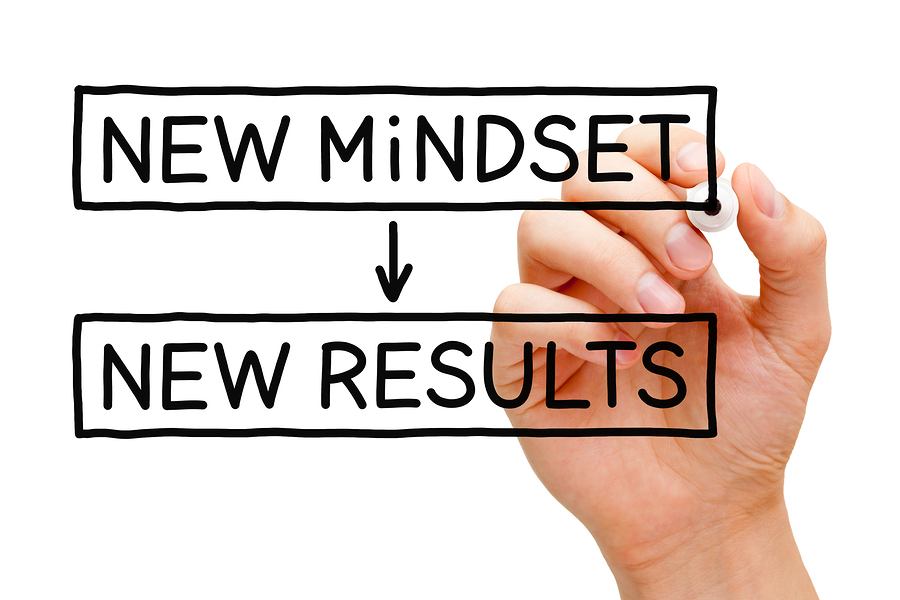LinkedIn Endorsements for Mental Health Professionals
More and more, when I teach to groups on Social Media ethics, people are asking me about LinkedIn endorsements.
- Should they use them?
- Should they feel bad if they don’t endorse someone back?
- Is it okay if they have been endorsed for skills they don’t have?
If you’re not sure what I’m referring to, it’s these graphic pictorials that now lie at the bottom of our LinkedIn profiles:
It seems like every time I log into LinkedIn, a whole batch of new people have endorsed me for a skill and I’m being given a window with a bunch of tags and plus signs telling me to endorse them back.
The problem is, some people are endorsing me for skills I don’t have (such as neuropsychological assessment). And since I network with many clinicians I haven’t always met personally (some of them have taken a class of mine and wish to connect or some of them I know via email lists), some of the people endorsing me are not really familiar with my skills as a psychologist.
It is certainly nice that people believe I’m good at these things. But I’m not clear they actually have the personal knowledge of me to endorse me for these skills, and I certainly don’t know them well enough to offer a return endorsement for their work.
The challenge with mental health work is that unless you’ve seen me teach (or vice-versa), or unless we’ve consulted on cases together, or unless you’ve received psychotherapy from me (in which case, I am not allowed to ask for a testimonial or endorsement), most of what we actually do that involves our skills is a private endeavor between ourselves and our clients.
We can be friends with other clinicians and like them very much, but we still do not know what happens behind the closed doors of their office when they see clients, unless we have supervised their work. And, unless it’s live or taped supervision, it’s still a recounting of the work…not direct observation.
There are just a handful of people whose skills I can comment on, and those are people with whom I’ve met regularly to discuss cases, ethical questions, or whose classes I’ve attended. Other than that, I cannot accurately comment on the skills of colleagues when I have no direct knowledge of how they perform such skills, no matter how great their reputations may be. And while it’s a nice compliment, it’s an empty one if they are commenting upon skills I have if they aren’t intimately involved in my work.
I have spoken to more than one clinician who has said:
“I feel bad because people have endorsed me and I’m embarrassed because I haven’t gone back and returned the favor!”
Others say that they have accidentally clicked on the endorsement boxes and endorsed people they don’t even really know because LinkedIn made it easy to do that without realizing that they had done so.
If you’re someone feeling bad because you have not endorsed your colleagues I say, “Don’t worry about it!”
While LinkedIn endorsements are the current rage, it probably isn’t really ethical to endorse colleagues for skills you think they may have. Or skills that they say they have.
As psychologists we actually have an ethical obligation to take responsibility for the statements others make about our professional practice and activities. In fact, when it comes to advertising and public statements, our Ethics Code for psychologists says under Standard 5.02:
5.02 Statements by Others (a) Psychologists who engage others to create or place public statements that promote their professional practice, products, or activities retain professional responsibility for such statements.
So if people are endorsing you for skills that you don’t believe you have, by all means, delete them. And if you don’t really know the work of your colleagues, don’t feel bad about ignoring LinkedIn’s suggestion that you endorse them.
Update: July 9, 2013
Thank you to Roy Huggins, MS, NCC, who in his comments below includes the ACA and NASW Ethics Codes. I’d add that AAMFT Code of Ethics (2012), which is one of the few Ethics Codes that has been updated to include the Internet, includes the following relevant statements about advertising:
Principle VIII
Advertising
Marriage and family therapists engage in appropriate informational activities, including those that enable the public, referral sources, or others to choose professional services on an informed basis.
8.1 Accurate Professional Representation. Marriage and family therapists accurately represent their competencies, education, training, and experience relevant to their practice of marriage and family therapy.
8.2 Promotional Materials. Marriage and family therapists ensure that advertisements and publications in any media (such as directories, announcements, business cards, newspapers, radio, television, Internet, and facsimiles) convey information that is necessary for the public to make an appropriate selection of professional services and consistent with applicable law.
8.6 Correction of Misinformation. Marriage and family therapists correct, wherever possible, false, misleading, or inaccurate information and representations made by others concerning the therapist’s qualifications, services, or products.
8.8 Specialization. Marriage and family therapists do not represent themselves as providing specialized services unless they have the appropriate education, training, or supervised experience.


July 8, 2013 @ 10:36 am
Yes, indeed. Well said.
May I add that if anyone finds it overly easy to endorse someone for a skill on LinkedIn then consider the question of how many of the people making skill endorsements are fully cognizant of what they’re doing and what it means. Between that and automatic invites for people in your contact book, LinkedIn can be tricky like that.
I’d also like to contribute that counselors and social workers are ethically mandated to consider how they are represented in public:
“Counselors make reasonable efforts to ensure that statements made by others about them or the profession of counseling are accurate.”
ACA Code of Ethics, 2005, C.3.c
“Social workers should ensure that their representations to clients, agencies, and the public of professional qualifications, credentials, education, competence, affiliations, services provided, or results to be achieved are accurate…”
NASW Code of Ethics, 2008 revision, 4.06.c
July 8, 2013 @ 8:36 pm
Thank you, Roy. I’d intended to include the CAMFT and NASW ethics codes in that post and then forgot to add them. Thank you for rounding out the conversation.
Linkedin for Counsellors | Digital Doctor
April 15, 2015 @ 11:03 pm
[…] you and your abilities. By uploading your list of skills people can endorse you for your skill. This piece written by Dr. Keely Holmes on using Linkedin endorsements for professionals is a very good […]